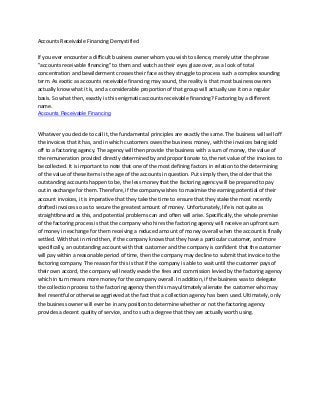
Accounts receivable financing21
- 1. Accounts Receivable Financing Demystified If you ever encounter a difficult business owner whom you wish to silence, merely utter the phrase "accounts receivable financing" to them and watch as their eyes glaze over, as a look of total concentration and bewilderment crosses their face as they struggle to process such a complex sounding term. As exotic as accounts receivable financing may sound, the reality is that most business owners actually know what it is, and a considerable proportion of that group will actually use it on a regular basis. So what then, exactly is this enigmatic accounts receivable financing? Factoring by a different name. Accounts Receivable Financing Whatever you decide to call it, the fundamental principles are exactly the same. The business will sell off the invoices that it has, and in which customers owes the business money, with the invoices being sold off to a factoring agency. The agency will then provide the business with a sum of money, the value of the remuneration provided directly determined by and proportionate to, the net value of the invoices to be collected. It is important to note that one of the most defining factors in relation to the determining of the value of these items is the age of the accounts in question. Put simply then, the older that the outstanding accounts happen to be, the less money that the factoring agency will be prepared to pay out in exchange for them. Therefore, if the company wishes to maximise the earning potential of their account invoices, it is imperative that they take the time to ensure that they stake the most recently drafted invoices so as to secure the greatest amount of money. Unfortunately, life is not quite as straightforward as this, and potential problems can and often will arise. Specifically, the whole premise of the factoring process is that the company who hires the factoring agency will receive an upfront sum of money in exchange for them receiving a reduced amount of money overall when the account is finally settled. With that in mind then, if the company knows that they have a particular customer, and more specifically, an outstanding account with that customer and the company is confident that the customer will pay within a reasonable period of time, then the company may decline to submit that invoice to the factoring company. The reason for this is that if the company is able to wait until the customer pays of their own accord, the company will neatly evade the fees and commission levied by the factoring agency which in turn means more money for the company overall. In addition, if the business was to delegate the collection process to the factoring agency then this may ultimately alienate the customer who may feel resentful or otherwise aggrieved at the fact that a collection agency has been used. Ultimately, only the business owner will ever be in any position to determine whether or not the factoring agency provides a decent quality of service, and to such a degree that they are actually worth using.